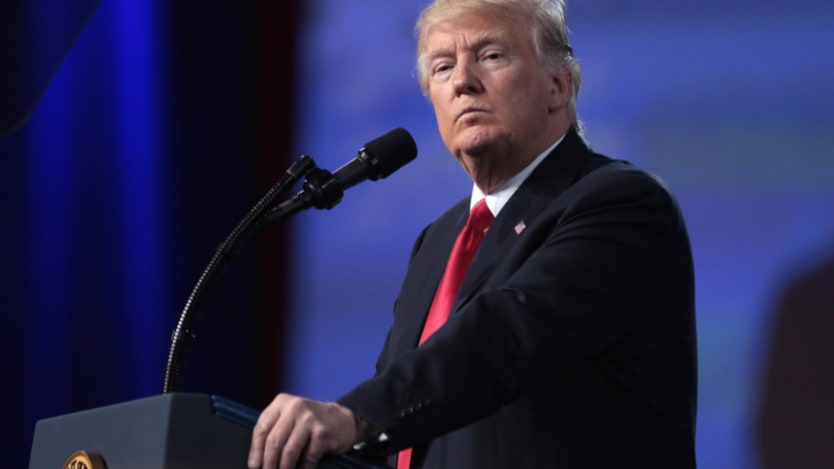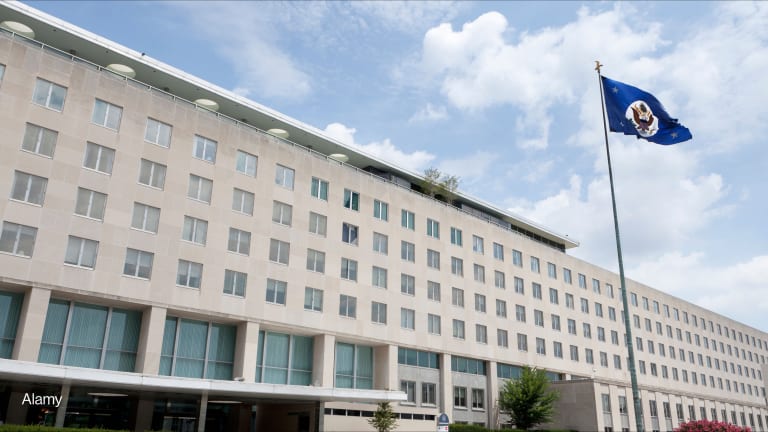
President Donald Trump’s first budget request sets the stage for a battle to protect U.S. global development investments from a White House intent on redirecting them to its own priorities.
The White House released Trump’s budget request for fiscal year 2018 on Tuesday. As expected, the budget describes a drastically reduced U.S. foreign assistance presence, with programs supported by the U.S. Agency for International Development cut by a full third from their 2016 levels.
The document provides a first comprehensive statement of what the administration views as top foreign affairs spending priorities. According to the budget, they include embassy security, commitment to Israel, defeating the extremist group the Islamic State of Iraq and Syria, preventing the spread or use of weapons of mass destruction, and maintaining U.S. humanitarian leadership while asking the rest of the world to contribute more.
Stay up to date on Devex coverage of U.S. foreign policy under Trump:
▶ Trump budget thrusts US foreign aid into a political fight
▶ As budget negotiations begin, here's where US Congress stands on foreign aid
▶ US budget chief explains deep foreign aid cuts
▶ Trump nominates Mark Green as USAID administrator
▶ Amid numerous US foreign aid concerns, can OPIC find the support it needs?
The president’s proposal represents an opening salvo in a budget negotiation expected to drag on throughout the summer. The U.S. Congress is now responsible for coming to an agreement on spending levels, in what will amount to a test of both bipartisan support for U.S. global development efforts and of the development community’s ability to advocate for its programs. Members of Congress, including both Republicans and Democrats, balked at the idea of 30 percent funding cuts when the number was first leaked, so many observers believe the final budget will not have such steep cuts.
Many details of the budget proposal were known in advance, partly from the “skinny budget” outline the White House released in March, and also from a leaked budget spreadsheet published last week, which suggested deep cuts to a variety of development accounts, including global health and humanitarian assistance. The cuts outlined in that document appear to have been borne out in the official release.
Overall, Trump requested $15.4 billion for programs managed by USAID, down from $23.2 billion in accounts fully and partially managed by USAID in 2016, according to a USAID spokesperson. The president’s budget request includes a total of roughly $40 billion for international affairs spending, including money drawn from the Overseas Contingency Operations account, which funds conflict areas. That compares to roughly $55 billion appropriated in 2016.
Trump’s budget outline includes a proposal to combine USAID’s Development Assistance account, which funds a wide range of development programs, with the Economic Support Fund controlled by the State Department, creating a joint Economic Support and Development Fund. This account, however, would see a large reduction from the combined resources of its two predecessor accounts. Together, DA and ESF amounted to $7.1 billion in 2016. Under Trump’s plan, the combined appropriation would be $4.9 billion.
Trump budget thrusts US foreign aid into a political fight
The foreign aid budget has enjoyed quiet bipartisan support for over a decade. President Donald Trump's budget request threatens to make it a political issue, warn development insiders.
“The 2018 Budget frees up funding for rebuilding the U.S. military and pursuing critical domestic priorities by focusing foreign assistance in regions and on sectors that advance our national security and our goal of defeating ISIS and other transnational terrorist groups, while also continuing to support key strategic partners and allies, foster economic opportunities for U.S. businesses, and ensure efficiency, effectiveness, and accountability to the U.S. taxpayer,” the document states.
As the earlier leaked document suggested and Devex reported, Trump’s proposal includes the elimination of Title II Food for Peace, opting instead to deliver food aid through the International Disaster Assistance account, which the president also proposes to cut by $300 million compared to 2016.
“Providing emergency food aid through IDA has been shown to allow more appropriate and on average more cost effective assistance than Title II food aid,” the budget document reads.
The budget proposal also includes cuts to the McGovern-Dole school food aid program, which aims to improve school attendance. Overall, the president’s budget proposal calls for the total elimination of 17 different budget lines within the foreign affairs account.
At the same time that USAID sees its budget drastically reduced in the budget request, the president proposes a slight increase for the watchdog office responsible for investigating allegations of waste, fraud and abuse at the agency. The USAID inspector general’s office would see a budget increase of $3.1 million, in part to support additional audits and investigations for USAID programs in Iraq and Syria.
Trump’s budget request includes a $2 billion overall cut to global health programs. PEPFAR — the HIV/AIDS initiative — would receive just over $3.8 billion under the president’s budget plan, down roughly 10 percent from 2016. The U.S. contribution to the Global Fund to Fight HIV, Tuberculosis and Malaria would be just over $1.1 billion, down $225 million from what the U.S. pledged in the fund’s last replenishment meeting in 2016.
This budget also sends a strong signal about U.S. engagement in international organizations and programs working on development issues — from the United Nations, to the World Bank and other multilateral institutions, where the budget says the U.S. pays more than its fair share.
Perhaps most dramatic is the elimination of the International Organizations and Programs account. In 2016, $337 million was distributed through the account to organizations that do not receive funding through the U.N. assessed funds, such as the U.N. Office for Coordination of Humanitarian Affairs, the United Nations Development Programme, UN Women, United Nations Population Fund and the United Nations Framework Convention on Climate Change. The budget document justified the cut by saying it would “reduce or end direct funding to international organizations whose missions do not substantially advance U.S. foreign policy interests, are duplicative, or are not well-managed.”
The U.S. assessed contribution to the U.N. is also cut from about $1.3 billion in 2016 to $900 million in the proposed budget. Funding for United Nations peacekeeping operations would be gutted, down from $2.4 billion in 2016 to $229 million in the proposed budget.
Funding to the World Bank’s International Bank for Reconstruction and Development was cut from $186 million to zero, although about $102 million will go to IBRD to fund the Global Environment Facility, which will receive about $66 million less than in 2016. The budget said the funding for GEF “benefits the U.S. economy and environment.”
Funding to the Asian Development Bank is cut more than 50 percent, while funding to the Inter-American Development Bank, where the U.S. is the largest shareholder, is cut entirely. The African Development Bank will see a small decrease in funding.
Amid numerous US foreign aid concerns, can OPIC find support?
In a contentious and busy political environment, can the Overseas Private Investment Corporation, slated for elimination by the Trump administration, find the support it needs despite a laundry list of other Congressional priorities?
The budget also confirms previous reports that the president aims to have several smaller development organizations shut down, although they do receive some funding in this budget to wind down operations gradually. On that list are the Overseas Private Investment Corporation, the U.S. Trade and Development Agency, the U.S. African Development Foundation and the Inter-American Development Foundation.
On OPIC, for example, the budget reads: “...the Budget proposes to eliminate funding for several independent agencies, as well as funding to support new loans and guarantees at the Overseas Private Investment Corporation. The Budget requests $60.8 million to manage the agency's remaining $22 billion portfolio and initiate orderly wind-down activities.”
Speaking to reporters on Monday ahead of the official budget release, White House budget director Mick Mulvaney was candid about the proposal’s chances of becoming law now that responsibility for the budget process shifts to lawmakers on Capitol Hill.
“Do I expect them to adopt this 100 percent, wholeheartedly, without any change? Absolutely not,” Mulvaney said. “Do I expect them to work with the administration on trying to figure out places where we're on the same page? Absolutely.”
Stay tuned to Devex for more news and analysis of what the Trump administration means for global development. Read more coverage here and subscribe to The Development Newswire.









